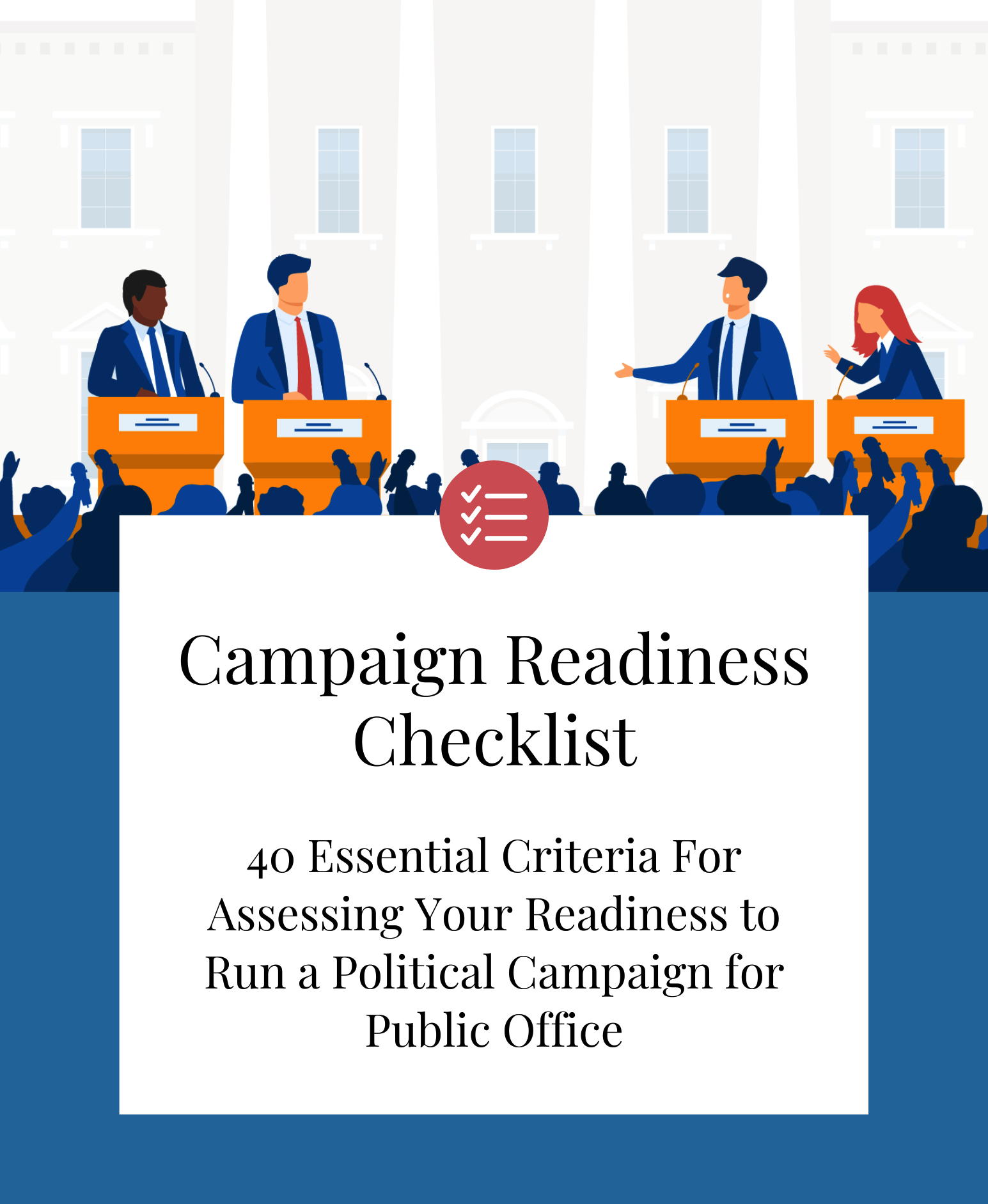Deciding to run for office can feel both exciting and overwhelming, especially for first-time candidates. Having served two terms as a local elected official and spent over a decade helping candidates at every level of office win, I’ve seen that one of the most important first steps in a successful campaign is defining why you’re running.
A clear “why” will not only help guide your campaign but also keep you motivated when challenges arise. Don’t worry if you’re not entirely sure where to start—by the end of this post, you’ll have the tools to clarify your ‘why’ and take the first step toward launching a strong campaign.”
Understanding the Importance of Finding Your “Why”
Voters are drawn to candidates with a clear and authentic reason for running. Your “why” forms the foundation of your campaign message and will help you connect with your audience. It works its way into almost everything you will do and say on your campaign.
In my years as a campaign manager, I’ve found that candidates with a well-defined purpose not only resonate more with voters but also maintain greater focus and passion throughout their campaign. Think about it: which candidates are you drawn to? The ones who tell you “vote for me because I’m not as bad as the other person” or the candidates who tell you a personal story about why they’re running and what motivates them to make a change? For me, I gravitate toward the latter. The doom and gloom, fear monger candidates don’t really do much for me, and I would argue they probably don’t make very good elected officials either because they don’t stand for anything and they’re too lazy to create a real reason for running. Perhaps they don’t have a reason – which is actually worse!
To inspire voters and develop a cadre of volunteers willing to support you, finding your “why” is an important step that you just cannot skip. It starts with thinking about your own personal motivations.
Reflect on Your Personal Motivation
Think about how you got the idea to run. What put that notion into your mind? What was the motivation for change? Name it. Write it down. Put it up on a white board and highlight it! If you’re not sure, start with self-reflection questions like:
- What issues in your community do I feel passionate about?
- What personal experiences have shaped my views on these issues?
- What change do I want to see, and why do I believe I’m the one to make it happen?
When I ran my first race for local city council (called commissioner in my town), the first issue that was very important to me was communication. It was important to me that I live in a place where the government communicates well with its residents. Good communication on the part of local government helps inform residents, but also shows them they care about what residents have to say. That, in turn, engenders a sense of cooperation and makes residents feel like their voice is important and that the things they care about are considered by their elected leaders.Most people don’t give their local government a second thought. The good ones are well run. But the reality is they’re well run because they have people who care. And anyone who has lived in a municipality that is not well run, or a place that is resource constrained, knows the terrible issues they face that make residents lives harder, not easier. Perhaps many of you come from a place where there is rampant mistrust of local elected officials. You could imagine this would be the case in places like Flint Michigan where elected officials made choices that endangered the lives of their residents. While that’s an extreme example, it’s a real one – and the fact is government only works because people make it work. And the people we choose to run our local governments are vitally important to how our country functions. How and what elected officials choose to communicate can make the difference between a vibrant, engaged community and a community where residents distrust their officials and each other.
Align Your “Why” with Your Community’s Needs
It’s important to ensure that your “why” resonates with the needs and concerns of your constituents. Ask yourself these questions:
- Are the issues I care about also top concerns for voters?
- How can I position yourself as someone who understands their needs and is ready to take action?
As a campaign manager, I’ve worked with candidates who struggled to make their message resonate with voters because they didn’t take the time to listen. Make sure you’re aligning your vision with what your community actually needs. Talk to people in your community—whether through informal conversations, surveys, or community events—and get a sense of what issues matter most to them.
How Defining Your “Why” Fuels Your Campaign Strategy
A well-defined “why” isn’t just about messaging—it will inform your entire campaign strategy, from how you fundraise to how you engage with voters. When your motivation is clear, donors are more likely to believe in your mission. Your “why” will also help shape your voter contact strategy, allowing you to engage with those who share your concerns.
In my experience managing campaigns, a clear “why” serves as a compass. When things get tough, or when decisions need to be made, you’ll return to it as your guiding principle. At the time I was talking to residents during my first campaign, abortion and reproductive rights and immigration were a hot-button topic on the national stage and voters who watched national news wanted to hear my position on it. Those topics were being asked of presidential candidates, but those were topics that were not relevant to the local conversation, nor were they things a local city council person could vote to change. Rather than get drawn into a heated partisan conversation, I simply refocused the conversation back to my “why” and told people the reason I was running and why I thought that was important to them. I told people directly, if those are issues you believe should be discussed here at the local level, I’d recommend discussing that with State Legislators. I’m focused on local issues – communication, government accountability, and public safety. When i explained that to people – most agreed the issues i brought up were very important. But before I left their doorstep, I would connect that resident to their state or federal legislator via email so they could have that conversation on abortion or immigration. That showed the resident that while I was not prioritizing that particular issue, it let them know I thought it was important enough to get them connected with the person who could address it. I never once answered a question about immigration or abortion, but I gained much more credibility than any of my opponents who tried addressing those questions with half hearted answers they never really believed in.That strategy worked every time.
Define Your “Why” and Start Building Your Reasons for Running
Defining your “why” is the foundation of a successful campaign. It shapes your message, aligns you with your community, and serves as your guiding principle. Remember, don’t wait—start defining your ‘why’ today. Once you’ve taken this crucial first step, everything else will fall into place as you build a campaign that’s focused, driven, and ready to win.
If you need more help refining your ‘why’ and building a successful campaign strategy, check out the How to Launch a Winning Political Campaign Course. It’s a step-by-step guide showing you everything you need to know in the first 30 days of your campaign – including how to develop your core message!



